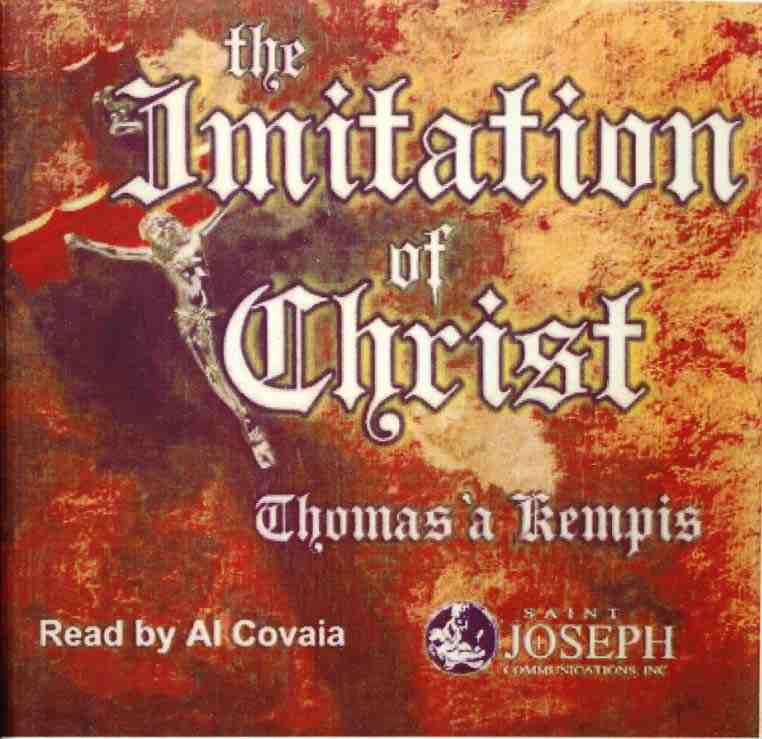don’t read classics and sleep over them, but create new ones…

 A small book has been in circulation in the Christian world for nearly five hundred years.
A small book has been in circulation in the Christian world for nearly five hundred years.
It has sustained the interior life of a million saintly souls.
It is a composition of a humble Augustinian monk from the Netherlands.
Next to the Bible, “OF THE IMITATION OF CHRIST” [possibly from around 1441] is the most read devotional book of the Continent.
This revered classic has enlightened stalwarts of faith and action like St Ignatius of Loyola, St Francis Xavier, St Thomas More and many more.
By 1779 there were 1800 editions and 50 translations of THE IMITATION.
An indication of the popularity of the book
As well as the popular hunger of the times…
The IMITATION must be considered more a following of the Lord, than an imitation.
“He who follows me will not…”
“He who follows me must deny himself, take up his cross and…”
Thomas a Kempis composed the IMITATION when one form of Europe was crumbling and yet another was emerging.
Older customs and systems were losing their value and authenticity …and new ones resurrecting.
As one commentator put it in context:
“At the time there was taking place a great divide between faith and reason, church and state, layman and monk.
Christendom thus far had been a safe unit, the mainland, beyond which only the sea or the vast desert for long.
But this Christendom gradually broke into separate islands, theologically, culturally and morally ever more and more distinct and divided.
The setting for the island by the fourteenth century was no longer outer darkness of sterile sea, but an ever increasing area neither holy nor sinful,
but secular, a neutral “no man’s land” which existed in every nation and state and empire: the realm of the layman.
The established institutions of the Church were inadequate to cope with the new situation,
and sagged under the burden of infusing the new realm with Christian piety, and incorporating it into the mainland.
Benedictine monasticism had become too propertied,
the Franciscans were paralyzed by internal dissensions [could the disciples of the Poor Man of Assisi wear stockings, own books or shave?]
and the great structure of medieval learning, that synthesis of lucid, logical thought and ordered prayer, was being frittered away by caviling and carping”.
Thomas a Kempis wrote most of his IMITATION as a dialogue between Jesus and himself.
From the depths of his soul to the ears of Jesus’ heart.
Here is an excerpt:
“Speak, Lord, for Thy servant heareth."
"I am Thy servant. Give me understanding that I may know Thine ordinances”
“. . . Incline my heart to Thine ordinances . . . “
“Let Thy speech distill as the dew”.
The children of Israel once said to Moses: "Speak thou to us and we will hear thee: let not the Lord speak to us, lest we die."
Not so, Lord, not so do I pray.
Rather with Samuel the prophet I entreat humbly and earnestly: "Speak, Lord, for Thy servant heareth."
Do not let Moses or any of the prophets speak to me; but You speak, O Lord God, Who inspired and enlightened all the prophets; for You alone, without them, can instruct me perfectly, whereas they, without You, can do nothing. They, indeed, utter fine words, but they cannot impart the spirit. They do indeed speak beautifully, but if You remain silent they cannot inflame the heart. They deliver the message; You lay bare the sense. They place before us mysteries, but You unlock their meaning. They proclaim commandments; You help us to keep them. They point out the way; You give strength for the journey. They work only outwardly; You instruct and enlighten our hearts. They water on the outside; You give the increase.
They cry out words; You give understanding to the hearer.
Let not Moses speak to me, therefore, but You, the Lord my God, everlasting truth, speak lest I die and prove barren if I am merely given outward advice and am not inflamed within; lest the word heard and not kept, known and not loved, believed and not obeyed, rise up in judgment against me.
Speak, therefore, Lord, for Your servant listens. "Thou hast the words of eternal life." Speak to me for the comfort of my soul and for the amendment of my life, for Your praise, Your glory, and Your everlasting honor.”
Certain characteristics of Thomas A Kempis stand pronounced.
He has six references to the Sacred Scriptures in this prayer that extends to a single page.
He begins with God’s Word and ends in Him.
Indeed a vigorous and healthy form prayer is to ground oneself in the inspired word of God.
Sure, Thomas calls upon Moses and Samuel, God’s foremost prophets.
But there is a recognizable reticence and weariness to stay in their company too long.
“Do not let Moses or any of the prophets speak to me”.
He launches himself into the arms of God…
It is God who saves.
It is Jesus who bleeds for me and redeems – not Moses or Samuel.
Yet another characteristic:
Thomas a Kempis offers his prayers in the presence of God – which is the most ideal temple to pray.
When and whenever …where and wherever I pray, that time and place is the holy hour and the hallowed sanctuary.
I submit that Thomas A Kempis and his IMITATION provide a final challenge to contemporary Christianity.
The process of Christendom dying and Christ resurrecting within it is an undeniable reality written across history.
In fact, the dying with all its attachments of agony and aching is the precondition for a rising.
Those who perceive that the older forms are passing away and arranging their funerals have a lot to learn from the saintly monk Thomas.
His message is not to repeat, re-read, recite or reprint his IMITATION…
Rather, he would challenge and dare – call on and demand – that today’s Augustinians and Benedictines,
Franciscans and Carmelites to come up with new forms of timely IMITATIONS.
Blessings on us.
GITANJALI A BERNARD, New York.
















